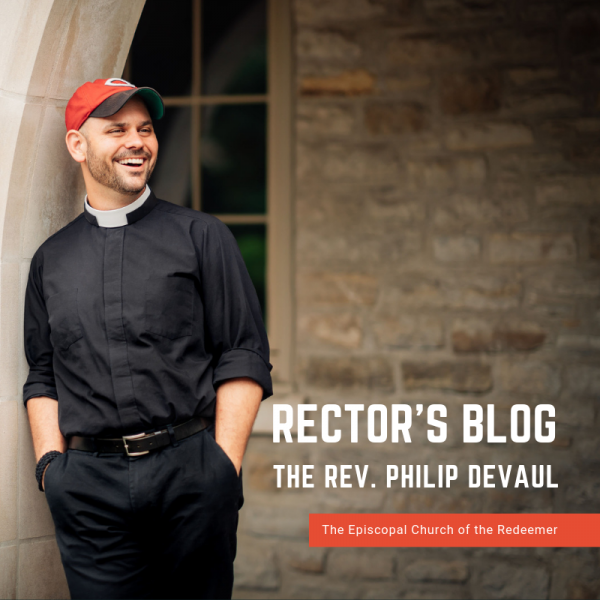Rector's Blog: Way of Love - Quarantine Style!

I remember when I was introduced to The Episcopal Church. I felt connected and at home very quickly, and I couldn’t quite put my finger on why that was. I found myself, and others who were new to this Anglican tradition sharing why we liked it, and I found us using a lot of negative language. That is to say, we were really good at saying we like The Episcopal Church because it’s not this, or because it doesn’t require that. To be fair, most of us were coming from other traditions and denominations – and so we had a picture of our minds about how this thing that was new to us was different and how that difference was good.
But eventually, I came to believe it wasn’t enough for me to know why I wasn’t something else. I wanted to have a positive articulation and understanding of what The Episcopal Church is, and why I was drawn to it. What are we? Asking this question has become a preoccupation of mine. What are we? Not what aren’t we, but what are we? What is the church? What is God making us? What would God have us be, and where are we living into that reality right now?
I believe The Episcopal Church has created an accessible, impactful articulation of who we are, and we have sought to implement the work of this articulation into the life of the Church of the Redeemer. It’s called The Way of Love, and I’ve spoken and written about it before, but considering the times in which we currently find ourselves, I believe it’s worth describing again. The Way of Love is a set of seven Jesus-centered practices that comprise an Episcopal rule of life.
The seven practices are titled: Turn, Learn, Pray, Worship, Bless, Go, Rest. We believe that a faithful engagement with these seven practices define the Episcopal experience of the Christian faith.
Anny Stevens-Gleason will talk more about the basis for a rule of life in our podcast, Interrupting Grace, this week, so I won’t get into the nitty-gritty of that here. What I want to point out today is the shift in mindset that’s required to embrace The Way of Love as a way of saying what you believe.
Think about it this way: If you are asked to say what you believe, you will likely set forth a series of principles, ideas, or facts you think are “true” or “good”. For instance, I’m a Christian, so if you ask me if I believe in the Resurrection of Jesus I would say, “Yes.” And I’d be being sincere – because I intellectually embrace the idea that Jesus’ resurrection happened. This is how we tend to understand belief. So I was blown away about a decade ago when I heard Christian philosopher Peter Rollins say, “If you ask me if I believe in the Resurrection, I say, ‘I don’t believe in the Resurrection when I don’t love my enemies. I don’t believe in the Resurrection when I don’t pray for those who persecute me. I don’t believe in the Resurrection when I disregard the poor and the marginalized.'"
Rollins’ words changed me. They shifted my understanding of belief away from simply stating things I thought were true to a more bodily experienced reality. They forced upon me the question, “What does it look like to actually believe in the Resurrection?” Rollins insisted that loving your enemies is what it looks like to believe in the Resurrection. Belief can’t just be something we think. Belief is shown forth in how we live. Belief cannot live alone and isolated in the life of our minds. That is not belief. That is ideology. We breathe into and out of our beliefs as we walk in this world. Our actions are the embodiment of what we really believe.
I’m an Episcopalian now. I seek to live into that by centering my life on Jesus in an Episcopal community in the practices of Turning, Learning, Praying, Worshiping, Blessing, Going, and Resting.
But something has happened recently. You and I have been made to stay at home. To isolate. I’m now realizing that so much of how I walk The Way of Love has been tied directly to the daily structure of my church community. I depend so much on the ongoing rhythm of a fairly traditional church life to experience my belief. And that’s not bad, or wrong, or quaint, or old-fashioned. It’s just gone for now. It’s been taken away from me and from you and now we are left asking the question all over again, “What are we?"
There is a temptation to be overwhelmed in the current “What are we?”. I could drown in a list of things we aren’t right now and could feel directionless without the in-person interaction of my dear church life. This is exactly the time when I need to intentionally re-engage The Way of Love.
Call it The Way of Love: Quarantine Style!
Over the next few weeks, I will be writing blogs, and Anny will be recording podcasts that focus directly on the seven practices of this Rule of Life, and understanding how we can live into them right here and now – within the limitations of our current context. Because we believe that, while our lives have been interrupted, our faith has not been. We have the opportunity here and now not just to think our beliefs, but to live into them. We believe that we are church right now. We invite you to explore this Way of Love and see what you really believe.
Tags: Rector's Blog